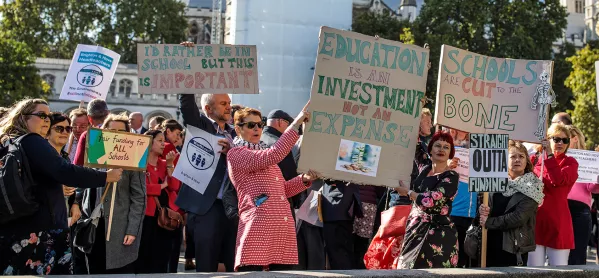‘It’s shameful to mock the headteachers’ march’
Share
‘It’s shameful to mock the headteachers’ march’
Those two tweets encapsulate the reaction of the media to last Friday’s (28 September) protest march on Downing Street by more than 1,000 headteachers.
The hint of scorn from the ITV News political editor was patronising and lazy. Worse, an unnecessarily vicious little dig came from a talk radio host, whose Tweet sneered at heads taking time out of school and wondered if they’d fine themselves as they do parents who take their children on holiday in term-time.
If some in the media chose to downplay that necessary, heartfelt protest, the two most recent party conferences simply ignored it. Labour’s Angela Rayner expressed solidarity with the march: but her grand vision focused not on funding but on still more systemic and structural change (heads have faced too much of that over the years).
Secretary of state Damian Hinds played to the gallery, or at least to his audience, and carefully avoided mentioning five major issues currently confronting schools, top of those being the funding issue as Martin George outlined in Tes this week.
How often do teachers hear, when they come in on Monday morning, “I saw you in Sainsbury’s on Saturday, Miss,” or, when they are on the beach in August, the dreaded “Hello, Sir!”? When heads take on that enormously responsible role, they accept society’s even higher expectation: always available, always on show, rarely, if ever, able to hide away.
Headteachers deserve respect
Just as you won’t readily see heads photocopying their bottoms at the staff Christmas party, you’ll rarely spot them in the street waving placards or shouting. They don’t do demonstrating. Making a fuss, drawing attention to themselves goes against their unwritten professional code. And when they are obliged to make a point, as they were last Friday, they’ll do it politely - as they did.
It goes against the same code to take time out of school, even to make a point to the seat of government. The constant tsunami of demands for urgent attention makes them reluctant to leave their desk - even for a morning, even when there’s a national crisis.
So this demonstration was bound to be unmilitant, courteous. It wasn’t even union-organised. The two heads’ unions (NAHT and ASCL) supported, but the event wasn’t their brainchild; rather (and tellingly), it was arranged by heads for heads. It was carried out quietly and professionally, reflecting the way heads do their jobs. To underestimate the seriousness of the gesture is wilfully to ignore the financial plight of the nation’s schools.
Contrast that dignity with the shameless obfuscation in the government’s response. Minister for school standards Nick Gibb’s parroted claim that school funding is at record levels was cynically misleading. The BBC has confirmation from the Organisation for Economic Cooperation and Development that his oft-cited “record figure” - globally the third highest in 2015 (not 2018) - includes such non-school costs as university spending, students’ personal outlay (billions of pounds) on tuition fees and even the fees parents pay for private schools.
Politicians may peddle fibs and half-truths. Headteachers don’t. When they raise their collective voice, quietly, moderately, firmly, they should be heeded and granted the respect they earn day in, day out.
These are dedicated professionals committed to making a difference and forced, on this occasion, to speak unwelcome truth to indifferent power. For politicians to ignore them, or media figures to mock, is shameful.
Dr Bernard Trafford is a writer, educationist and musician. He is a former independent school headteacher and a past chair of HMC. He Tweets at @bernardtrafford




